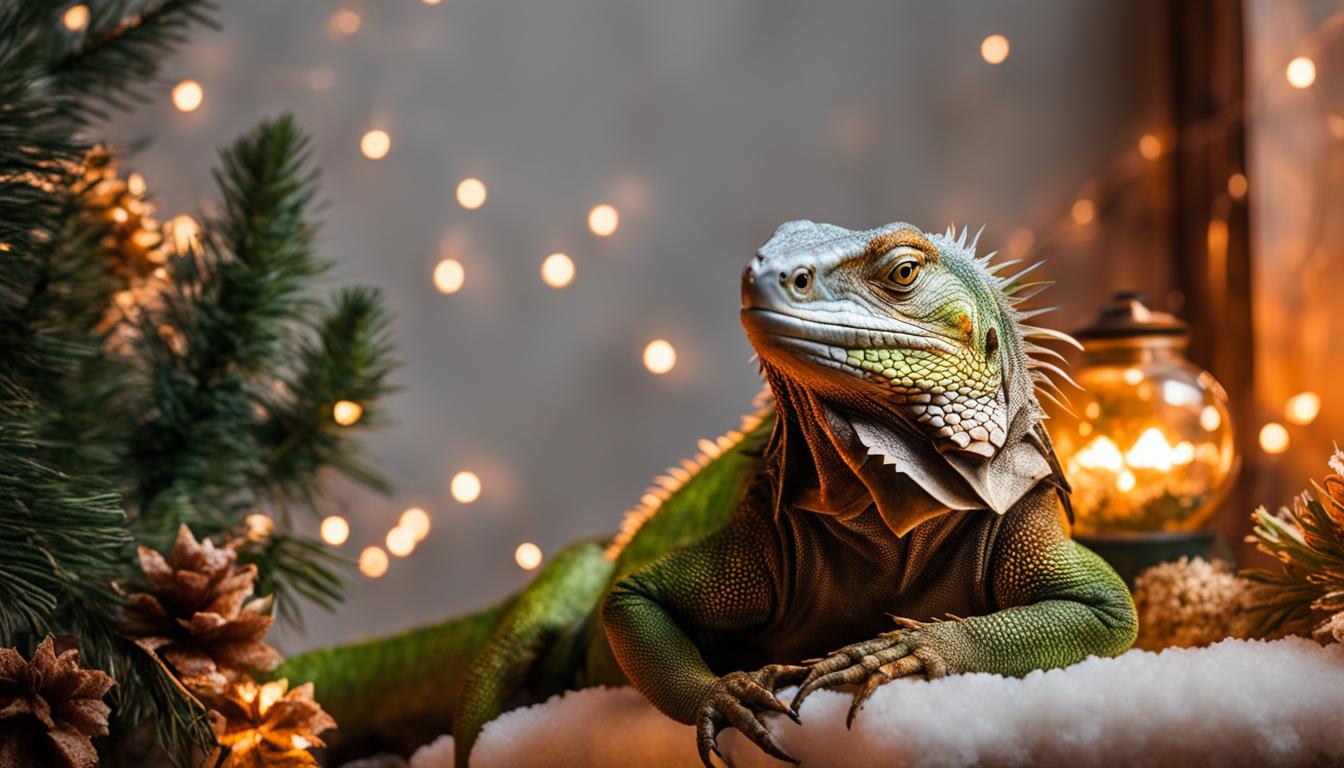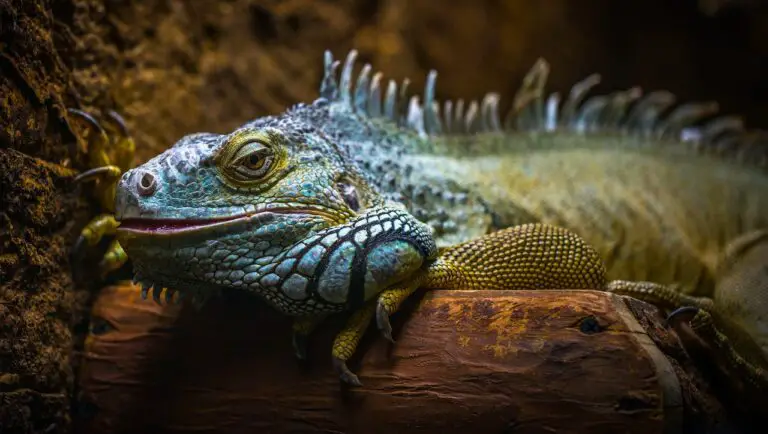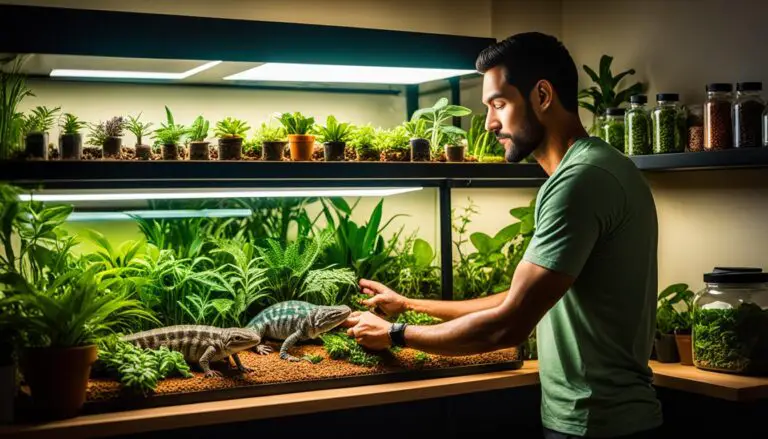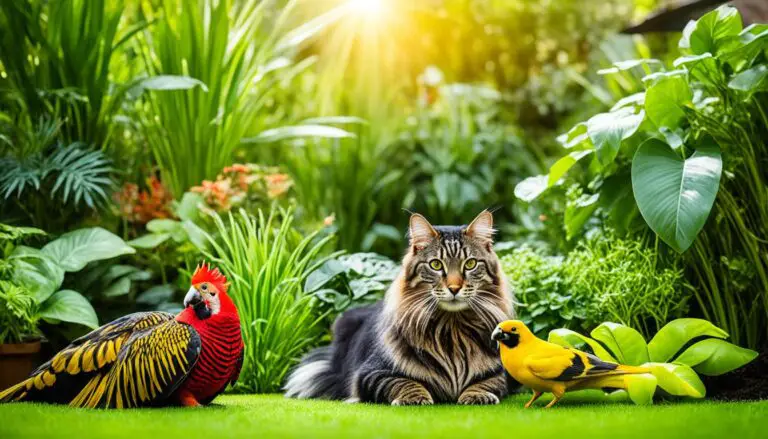Exotic Pet Care During Winter: Tips & Advice to Stay Cozy
Proper care of exotic pets in winter is crucial to ensure their health and well-being. Sudden changes in temperature can be dangerous for reptiles, birds, and other exotic pets. Here are some tips to keep your exotic pets healthy and happy during the winter months.
Key Takeaways:
- Provide a supplemental heat source for reptiles to maintain their body temperature.
- Use proper bedding and hutch covers to keep small mammals warm.
- Keep birds away from drafty areas and cover their cage at night.
- Monitor the temperature inside snake habitats regularly to prevent hypothermia.
- Consult with your veterinarian for specific guidelines based on your pet’s needs.
Winter Care for Reptiles
Reptiles are ectothermic, which means they rely on their environment to regulate their body temperature. During the winter months, it’s crucial to provide proper care for your reptile to ensure their immune function and metabolism are maintained.
To keep your reptile cozy and healthy, it’s essential to provide a supplemental heat source. Different reptile species have different temperature requirements, so consulting with your veterinarian is important to ensure you provide the right conditions.
A heating lamp or heating pad can be used to maintain controlled temperatures within the reptile’s enclosure. It’s best to place the heat source at one side of the enclosure, creating a temperature gradient. This allows your reptile to regulate its body temperature by moving between warmer and cooler areas.
When setting up the heating equipment, make sure it is securely installed to avoid any accidents or injuries. Always use thermostats to regulate the temperature and prevent overheating. Regularly check the temperature inside the enclosure to ensure it remains within the appropriate range for your reptile’s species.
Remember that maintaining humidity is also crucial for reptiles, especially those from tropical or semi-tropical regions. During the winter, the air tends to be drier, so using a reptile-safe humidifier or increasing the misting frequency will help keep the humidity levels suitable.
“Proper heating and humidity are vital for reptiles during the winter months. By creating a warm and comfortable environment, you can ensure the well-being of your scaly friends.” – Dr. Ava Johnson, Reptile Specialist
Additionally, you should ensure that your reptile’s enclosure is free from drafts and kept away from windows or doors that can let in cold air. It’s also important to provide proper bedding materials that retain heat and offer insulation, such as reptile carpets or terrarium moss.
Lastly, pay attention to your reptile’s behavior and appetite during the winter. Some reptiles may naturally reduce their activity levels or enter a period of brumation, which is a type of hibernation. However, if you notice any unusual changes in behavior or appetite, consult your veterinarian as it may indicate health issues.
By following these winter care tips for reptiles, you can ensure that your scaly companions stay healthy and happy throughout the colder months.
Winter Care for Small Mammals
During the winter months, small mammals like guinea pigs and rabbits require extra care to protect them from the cold temperatures. It’s important to create a warm and cozy environment for them to ensure their health and well-being. Here are some tips to help you provide the best winter care for your furry friends.
1. Create a Warm Enclosure
Make sure to provide a sheltered and insulated enclosure for your small mammals. Use proper bedding materials like straw or wood shavings to provide insulation from the cold ground. Additionally, consider using hutch covers to protect your pets from wind and rain. This will help maintain a comfortable temperature within their living space.
2. Provide Hiding Spots
Small mammals need places to hide and stay warm during the winter. Place cozy hiding spots, such as tunnels or soft fabric shelters, inside their enclosures. These hiding spots will give them a sense of security and provide additional warmth. Make sure to check them regularly for any damages or signs of wear and tear.
3. Adjust their Diet
In colder temperatures, small mammals require more calories to generate body heat and stay warm. You can adjust their diet by providing extra portions of high-quality hay, which is not only a vital source of fiber but also generates internal heat during digestion. Consult with a veterinarian for specific dietary recommendations based on the species of your small mammals.
| Types of Winter Foods for Small Mammals | Benefits |
|---|---|
| Fresh Vegetables | Provide essential vitamins and minerals. |
| Fruits (in moderation) | Offer natural sugars and antioxidants. |
| Warm Bland Porridge | Offer a warm, comforting treat. |
| Commercial Pellets | Ensure a balanced diet. |
| Warm Water | Prevent dehydration. |
4. Regular Check-ups
Regular veterinary check-ups are important to ensure your small mammals are healthy throughout the winter. Schedule appointments to monitor their weight, dental health, and overall well-being. A veterinarian can provide guidance on any specific care requirements based on the unique needs of your small mammals.
By following these winter care tips, you can provide a comfortable and safe environment for your small mammals. Remember, the well-being of your furry friends should always be a priority, especially during cold weather.

Winter Care for Birds
Birds are especially sensitive to temperature fluctuations, and it’s important to provide them with proper winter care to ensure their health and well-being. Cold weather can stress their immune system and make them susceptible to illnesses. Here are some tips to keep your feathered friends warm and comfortable during the winter months.
1. Create a Draft-Free Environment
Position your bird’s cage away from drafty areas in your home, such as windows and doors. Cold drafts can be damaging to their respiratory system and can lead to illness. Additionally, avoid placing the cage near vents or radiators, as the hot air can dry out their delicate feathers.
2. Cover the Cage at Night
At night, when temperatures tend to drop, cover your bird’s cage with a cage cover or a thick blanket. This will help retain heat and create a cozy, dark environment that mimics their natural sleeping conditions. Make sure the cover is securely fastened so that your bird doesn’t become entangled.
3. Avoid Heating Hazards
Avoid using candles, space heaters, or any other heating sources near your bird’s cage. Birds are highly sensitive to fumes and can suffer from respiratory problems if exposed to them. Opt for safer methods of keeping them warm, such as providing extra bedding or using a bird-safe heating pad designed specifically for birds.
4. Provide Fresh Water Regularly
In the winter, it’s crucial to regularly provide fresh water to birds. Freezing temperatures can cause water sources to become unavailable, leading to dehydration. Use a heated bird bath or replace the water frequently to prevent it from freezing.
By following these tips, you can ensure that your birds stay warm and healthy throughout the winter season. Remember to monitor their behavior and consult with a veterinarian if you notice any signs of illness or discomfort.

Winter Care for Snakes
Snakes, like other reptiles, rely on their environment to regulate their body temperature. It’s important to provide an external heat source, such as a tank heater or heat lamp, to ensure their body functions properly. Monitor the temperature inside their habitat regularly to prevent hypothermia and other health issues.
To ensure optimal snake care during winter, it is essential to maintain a suitable temperature in their habitat. A tank heater or heat lamp can be used to provide the necessary warmth. Place the heat source on one side of the enclosure, creating a temperature gradient. This allows snakes to choose their preferred temperature by moving between warmer and cooler areas.
It’s important to monitor the temperature inside the enclosure using a thermometer. Snakes require a specific temperature range based on their species. For example, a ball python may need a temperature range of 75-85°F (24-29°C) during the day, while a corn snake may require 80-85°F (27-29°C). Consult with a veterinarian or reptile specialist to determine the appropriate temperature range for your specific snake.
Additional Tips for Snake Care During Winter
- Ensure proper insulation of the enclosure to prevent heat loss. Use materials like foam panels or thermally-insulated enclosures.
- Do not place the snake’s enclosure near drafts or cold areas, such as windows or doors.
- Avoid sudden temperature fluctuations that can stress the snake. Maintain a consistent temperature within the recommended range.
- Provide ample hiding places, such as caves or logs, for the snake to retreat to and regulate its body temperature.
- Monitor humidity levels in the snake’s enclosure as well. Use a hygrometer to ensure an appropriate level of humidity.
Proper care and attention to temperature conditions are vital for the well-being of snakes during winter. By providing the necessary heat source, monitoring the temperature, and creating a suitable environment, you can ensure that your snake stays healthy and comfortable throughout the colder months.
| Snake Species | Temperature Range (°F) | Temperature Range (°C) |
|---|---|---|
| Ball Python | 75-85°F | 24-29°C |
| Corn Snake | 80-85°F | 27-29°C |
| Boa Constrictor | 80-90°F | 27-32°C |
| Reticulated Python | 85-95°F | 29-35°C |
Conclusion
Proper care of exotic pets during the winter months is crucial for their health and well-being. By following these winter pet care tips, you can ensure that your beloved pets stay happy and healthy throughout the cold season.
First and foremost, provide a warm and cozy environment for your exotic pets. This can be achieved by using heating pads, heat lamps, or specialized heaters designed for their specific needs. These heat sources will help maintain the optimal temperature range for your pets, keeping them comfortable and preventing issues like hypothermia.
In addition to maintaining a warm environment, it’s important to adjust their diets during winter. Providing foods that are rich in calories and nutrients will help them generate the energy needed to stay warm. Consult with your veterinarian to determine the appropriate dietary changes for your pet’s species and individual needs.
Lastly, regularly monitor your exotic pet’s temperature and hydration levels. Keep an eye on their water bowls, making sure they have access to fresh and clean water at all times. Also, be aware of any signs of dehydration or overheating, and take necessary steps to address these issues promptly.
Remember, each exotic pet has unique requirements, so consult with your veterinarian for specific guidelines tailored to your pet’s species and needs. By prioritizing winter pet care and implementing these tips, you can ensure that your exotic pets stay happy, healthy, and cozy throughout the winter season.
Source Links
- https://www.pethealthnetwork.com/all-pet-health/reptile-health-care/tips-keeping-your-exotic-pet-safe-during-cold-weather
- https://www.theuniversityanimalclinic.com/services/blog/cold-weather-tips-exotic-pets
- https://www.aarp.org/home-family/friends-family/info-2024/pet-safety-during-winter.html
Peter Stones is the founder of Exotic Pets Place, the leading online resource for exotic pet care information.
With over 10 years of hands-on exotic pet ownership experience, he is deeply passionate about sharing his expertise to help others properly care for their unusual pets.
When he's not writing extensively researched articles or connecting with fellow exotic pet enthusiasts worldwide, you can find Peter at home tending to his own beloved menagerie of exotic animals.







